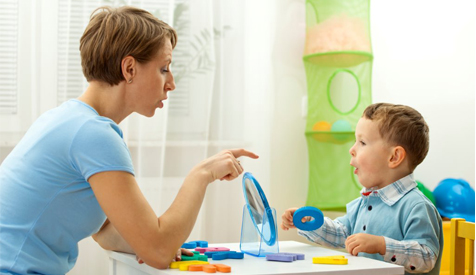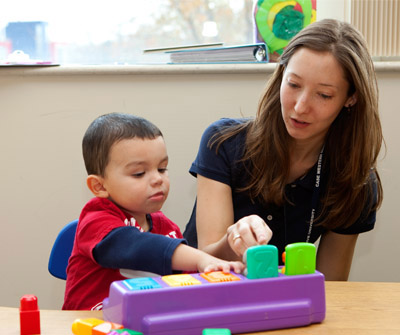If you are having difficulty understanding your child, you might want to consider a speech-language evaluation. An evaluation is a normal step to pursue when parents or caregivers suspect difficulty with communication.
Ask your pediatrician for a referral to a speech-language pathologist (SLP) - a professional who diagnoses speech and language difficulties. An evaluation will include the following:
Read More
Tags:
Speech,
Communication,
Voice,
toddler,
talking
Toddlers want to feel included and competent; choose books that your child can follow along with, especially those with repetitive text so he or she can fill in words. Maintain your toddler's interest by choosing books with small amounts of text on the page and books about topics that you know are of interest.
For younger toddlers (12 to 24 months) you'll want sturdy board books with pictures (especially photos) of kids doing the things they do every day. Books about bedtime, baths, or mealtime are all good choices; so are books about saying hello or good-bye. Keep active hands busy with lift-the-flap pages and textures to feel.
Read More
Tags:
Speech,
reading,
Voice,
toddler,
talking
Early in infancy, you will see signs that indicate that your child is hearing, listening, and understanding what is going on around him/her. Your child is learning language long before he/she produces that first word.
There is a typical progression to language development. Initially, your child will turn to find sounds, follow with his/her eyes when something moves in their view, look at what you are looking at (joint attention). All of these skills are part of language development. Later, your child will respond by pointing or may get your attention by touching you or vocalizing.
Read More
Tags:
Speech,
Language,
Communication,
Voice,
toddler,
talking
There aren’t any magic tricks that we can use to prevent all tantrums, but there are some tips to help avoid some of the outbursts that may be happening more regularly.
First, make sure that your child is getting enough sleep, has a healthy diet, and has lots of time to run and play every day. Look at the big picture, and from there start to identify if there are triggers that will set-off a tantrum.
Read More
Tags:
Speech,
Language,
Communication,
Voice,
toddler,
talking,
tantrum
Playing with your child is a essential way to improve his/her speech, language, and social skills! Below are five different toys and ways to play with your child to encourage language growth and development:
Mr./Mrs. Potato Head:
- Following Directions: Ask your child to give you various parts. If this is too simple, ask him/her in a more complex way. For example, instead of asking for Mr./Mrs. Potato Head's shoes, say "the ones you put on your feet.” Sometimes this works best after the child has built Mr./Mrs. Potato Head and is asked to follow the directions of placing each part back into the box.
Read More
Tags:
Speech,
Language,
Communication,
Support,
Learning,
Voice,
toddler,
talking
Did you know…
- An estimated 40 million Americans experience speech, language, and/or hearing disorders.
- The second most common reason for special education services in public schools is speech/language impairment.
- 36 million American adults report so
Read More
Tags:
Speech,
Hearing Aid,
Audiology,
Language,
Hearing Aids,
Communication,
Hearing,
reading,
literacy,
Hearing Loss Prevention,
Teens,
Support,
Caregiving,
Hearing Loss,
Stuttering,
Learning,
Voice,
toddler,
talking,
Autism
Teaching your infant Baby Sign Language can help improve his or her communication skills. This is particularly appealing for new parents, given that there’s a gap between what babies and toddlers want to say and what they can verbally express.
Read More
Tags:
Speech,
Language,
Communication,
American Sign Language,
ASL,
Learning,
Voice,
toddler,
talking
Children who have been identified with speech-language impairments have likely established nonstandard patterns of speaking or have deficits that will require extra attention and training to improve. The speech-language pathologist (SLP) working with you and your child should serve as a "coach" to provide you with activities or homework to reinforce newly established skills and to strengthen emerging skills. One or two sessions a week is not enough, and your involvement in carryover activities is crucial to your child's communication development. Talk with your SLP about activities and games you can use at home to help.
Read More
Tags:
Speech,
reading,
literacy,
Teens,
Support,
Learning,
Voice,
toddler,
talking
Experts recommend you read to your child as often as you can and that you strive to have at least one scheduled reading time each day. Choosing regular times to read (especially before naps and bedtime) is a way to help your child learn to sit with a book and relax. But you can read anytime your child seems in the mood.
If your toddler will let you, hold him or her in your lap when you read. It's a great spot for:
Read More
Tags:
Speech,
Language,
Communication,
literacy,
Learning,
Voice,
toddler,
talking



















